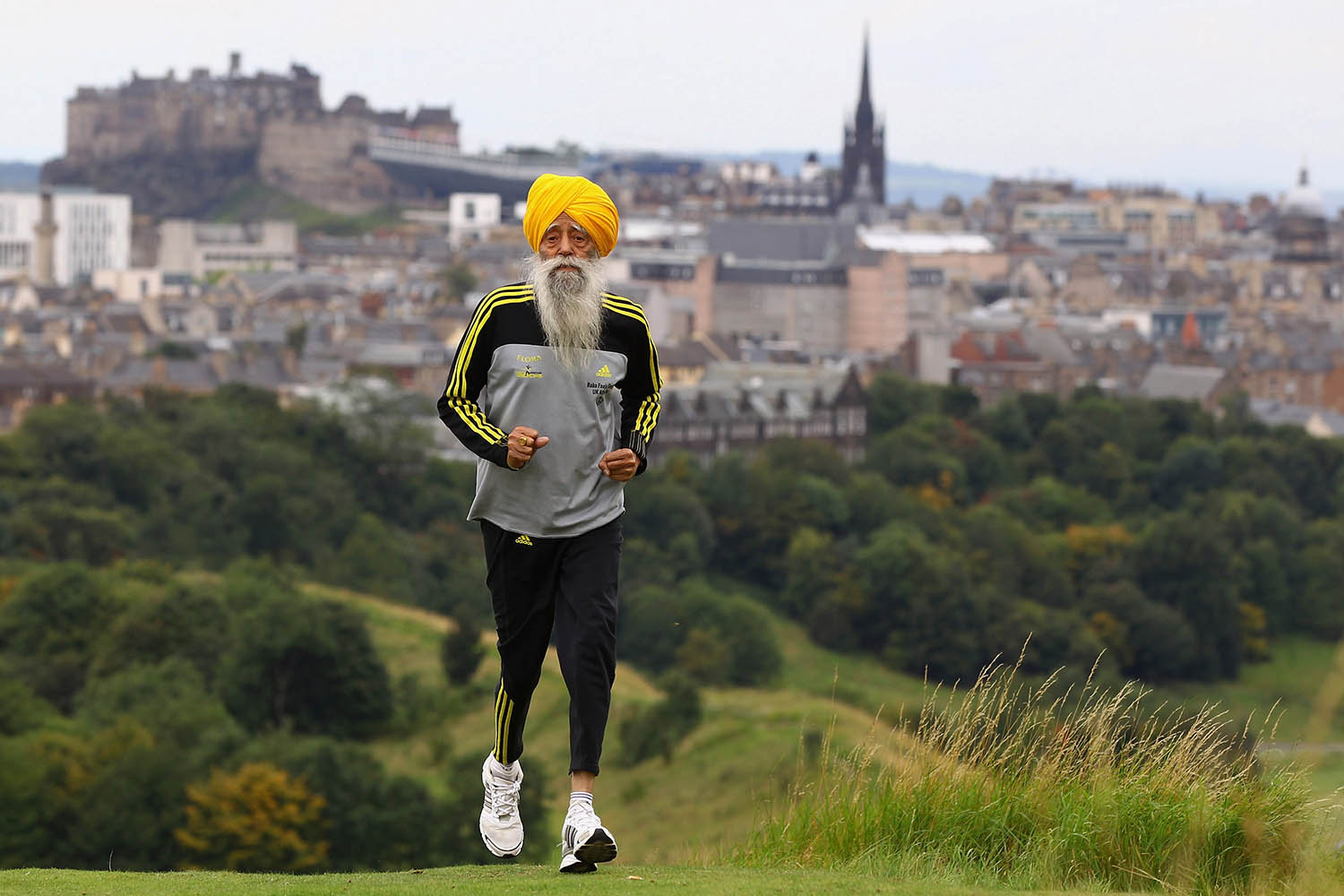When Fauja Singh did his first training session for the London marathon in 1999, he was unlike any of his coach’s other pupils. Not only was he very old, at 88, to be attempting his first 26-mile race but he appeared in a three-piece suit. Fauja had seen the New York marathon on TV and decided that this was what he wanted to do but, since this was London, standards had to be upheld.
Harmander Singh, who has trained hundreds of runners, persuaded him to remove his jacket and after a few medical questions asked him for his motivation. Fauja said he needed something to distract himself from the pain of losing his wife, his eldest daughter in childbirth and a son, whom he had seen struck on the head by a corrugated iron sheet in a storm.
After that, Fauja had emigrated from the Punjab to live with another son in Ilford, east London, where he took up running. He had done a 20km race but, unclear of the difference between metric and imperial measurements, assumed the marathon was 6,000 metres further, not more than twice the distance. Still, when this was explained, he was undaunted.
“I felt he was different to anyone I’d trained,” Harmander said. “He had a glint in his eyes.”
Fauja kept challenging his coach to make him run farther. Five months later in 2000, Fauja was on the starting line in Greenwich Park to run for the neonatal charity Bliss. Harmander said: “It would be the oldest running for the youngest.”
In fact, he wasn’t quite the oldest – an American was three months older. Fauja easily beat him in 6hr 54min. It began a remarkable marathon career in which he raced in New York City and Toronto, which he completed in 5hr 40min in 2003, and six times in London.
“The first 20 miles are not difficult,” he said. “For the last six, I run while talking to God.”
In his last race in London, soon after his 101st birthday, he was one of only seven in the field aged over 80. Wearing an orange turban and waving two Union Jacks, he crossed the line in 7hr 49min. Dave Bedford, the former Olympic runner, said Fauja was one of the most memorable athletes in his time as the London race director.
Related articles:
“It was amazing he ran his first marathon at almost 90 and astounding that he was still moving well at 100,” Bedford said. “I’d just be happy to be able to stagger to the pub at that age.”
Fauja was born in 1911 in the village of Beas Pind in the north-western Indian state of Punjab. He did not walk until he was five and was nicknamed Danda, meaning “stick”, because of how he supported himself on weak legs. Though he ran as a young man, it was only after he moved to Britain in the 1990s that he started to challenge pensioners to race. He said: “If they looked healthy, I’d extend the distance.”
Newsletters
Choose the newsletters you want to receive
View more
For information about how The Observer protects your data, read our Privacy Policy
After running the London marathon in just over six hours in 2003, Fauja became a sporting hero, appearing in an ad campaign for Adidas with David Beckham and Muhammad Ali. He later did one for the animal rights charity Peta. A vegetarian, he also never touched rice or fried food, living off daal, flatbread, green vegetables and yoghurt.
At London’s Mile End Stadium in 2005, Singh beat British age group records for the mile and 200, 400, 800 and 3,000 metres in the space of 94 minutes, after which he was billed as the Turbaned Tornado. Six years later, he set five world age group records in Toronto and became the first centenarian marathon-runner.
They have not been acknowledged as official because of doubts about his true age. Birth certificates were not issued in Indian villages until Fauja was well into middle age. However, Harmander said there was a legal document marking when Fauja’s father gave him farmland at the age of 18 and that, while the birth date, given as 1 April, was not certain, it was common to put it down as the first day of the month of a Sikh festival, in this case Vaisakhi. Harmander observed that Fauja’s passport gave 1911 as his birth year and that he had received a telegram from the Queen in 2011.
In 2009, he and three other Sikhs formed a running group with a combined age of 336 to compete in the Edinburgh marathon relay. The group turned into a club, called Sikhs in the City, which, despite its name, now represents nine religions and has more than 400 members. Today, they will be running laps of Fauja’s 2km training course in Ilford to celebrate his life and promote a fundraiser to build a clubhouse.
Fauja’s final race was in Hong Kong in 2013. He spent his last few years in the village where he was born and died on Monday aged 114 after being struck by a car. Assuming the accuracy of his passport, he was the ninth oldest person on the planet and the oldest man by 18 months. Fauja said his longevity was due to eating small portions and regular exercise. As he neared 100, he walked for four hours a day while others sat still for the same time. He said: “Their legs are tired, mine are also tired. But my legs are healthier and theirs have got weaker.”
Fauja Singh, long-distance runner, was possibly born on 1 April 1911, and died on 14 July 2025, aged 114
Photograph by Jeff J Mitchell/Getty



